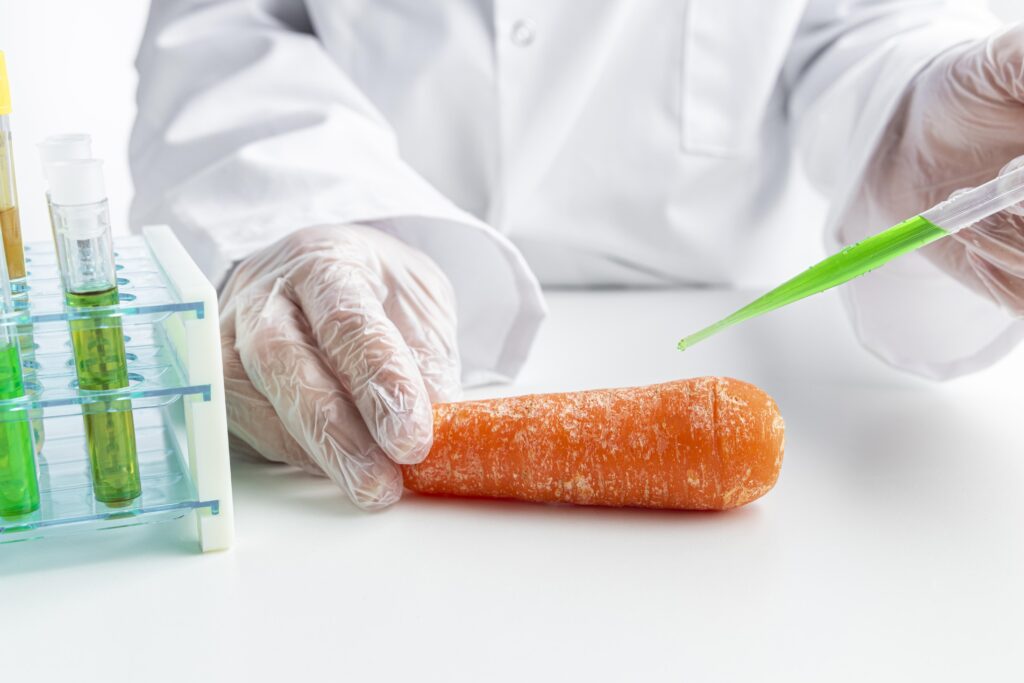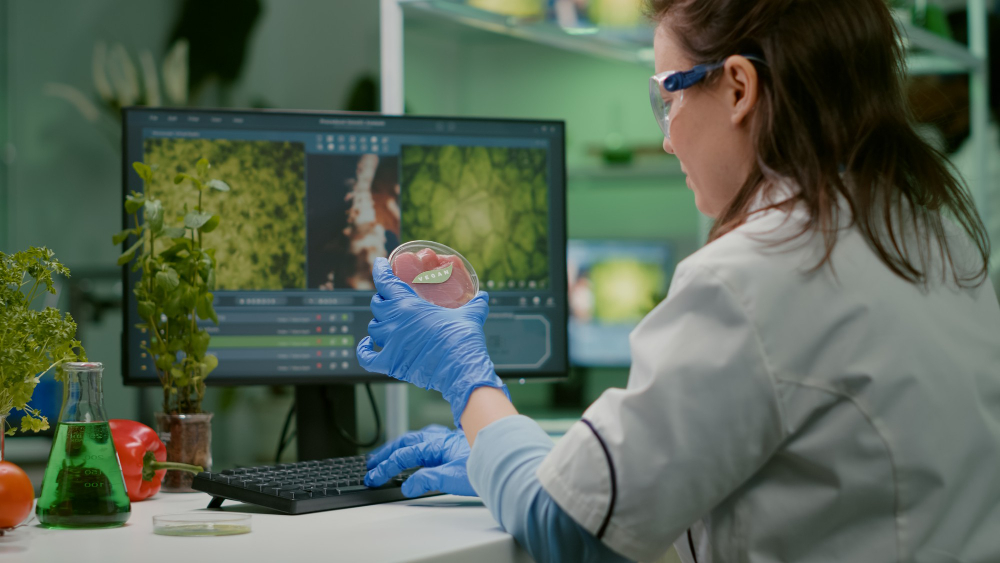In recent years, the field of food technology has seen remarkable advancements. And the need for more food sources is increasing with the population. So these led to the emergence of lab-grown meat. But is lab-grown meat vegan? We will find out in this article.
This innovation in meat production has raised questions about its vegan status. Is lab-grown meat compatible with veganism? In this article, we will explore the concept of lab-grown meat and compare it to plant-based alternatives.
What is Lab-Grown Meat?
Lab-grown meat is also known as cultured or cell-based meat. This is a revolutionary concept involving growing meat cells via in-vitro technique. Firstly, they obtain a small sample of animal cells. Then these cells are cultured in a nutrient-rich medium. It facilitates cell growth and multiplication.

Over time, the cells transition to become muscle tissue. This muscle tissue can be processed, and you can make your favorite burgers out of it. This is becoming a reality, and soon, lab-grown meat will be found on every table. Manufacturers achieve conventional meat’s taste, texture, and nutritional composition through this process. Moreover, it doesn’t need traditional animal farming.
What is Plant-Based Meat?
Ever thought about meat that is made from plants? You must understand the difference between lab-grown meat and plant-based meat. Plant-based meat includes all meat substitutes made purely from plant-derived ingredients. These products consist of proteins, fats, and other plant components.
It is carefully formulated to mimic the taste and texture of conventional meat. Unlike lab-grown meat, plant-based meat does not involve the use of animal cells in its production process. Instead, it relies on innovative techniques to create products that satisfy meat lovers’ cravings while offering a cruelty-free and vegan alternative.
Is Lab-Grown Meat Vegan?
Now, let’s address the burning question: Is lab-grown meat vegan?
The answer is not as straightforward as one might think. Cultured meat does not require animal slaughter. It uses animal cells as the basic unit. This extraction raises ethical concerns for some vegans. Vegans are against animal exploitation or harm.
Additionally, fetal bovine serum is a commonly used nutrient medium in production. So, this further complicates the vegan status of cultured meat. Considering these factors, cultured meat does not align with the vegan community’s values. So, we can say that lab-grown meat is not vegan.
Some argue that lab-grown meat has the potential to reduce animal suffering and the environmental impact associated with traditional meat production, making it a more ethical choice. Others believe that lab-grown meat falls short of vegan standards due to its initial reliance on animal cells and animal-derived ingredients like fetal bovine serum.
Can Vegetarians Eat Cultivated Meat?

While vegans may have reservations about consuming lab-grown meat, the question arises: Can vegetarians eat cultivated meat? Vegetarianism encompasses various dietary choices, with some vegetarians excluding meat while still consuming animal by-products like eggs and dairy. For these individuals, lab-grown meat might be an acceptable option as it doesn’t involve the slaughter of animals.
However, vegetarians must consider the sources of the initial animal cells used in lab-grown meat production and the potential presence of animal-derived ingredients. It’s a personal choice that each vegetarian must make based on their individual values and dietary preferences.
Pros and Cons of Lab-Grown Meat
To better understand the implications of lab-grown meat, let’s examine its pros and cons:
Pros:
Reduced animal suffering:
Lab-grown meat has the potential to minimize the need for traditional animal farming and reduce animal suffering.
Environmental benefits:
By reducing the demand for conventional livestock, lab-grown meat could help alleviate the environmental impact associated with meat production, such as deforestation and greenhouse gas emissions.
Food security:
Cultured meat has the potential to provide a sustainable and scalable solution to meet the growing global demand for meat.
Healthy control:
The production process of lab-grown meat allows for precise control over its nutritional composition, offering healthier meat options with lower levels of saturated fats.
Cons:
Technological challenges:
Lab-grown meat is still in its early stages of development, and there are significant technological hurdles to overcome before it can be commercially viable and widely available.
Cost:
Currently, the production of lab-grown meat is expensive, making it inaccessible to the general public. However, as technology advances, costs will decrease expectedly.
Regulatory approval:
The regulatory framework surrounding lab-grown meat is still establishing. It is approved in the US now, and many lab-grown meat companies manufacture it. Also, it may take time for the necessary approvals for widespread production and distribution worldwide.
Consumer acceptance:
Lab-grown meat faces a challenge in gaining widespread consumer acceptance. This is due to concerns about its safety, taste, and unnaturalness.
Will Cultured Meat Replace Traditional Meat?

The future of lab-grown meat and its potential to replace traditional meat is a topic of much speculation. Lab-grown meat has several advantages, including reduced environmental impact and animal suffering. On the other hand, there are various influential barriers to overcome to replace conventional meat. Most importantly, consumer acceptance will be crucial in determining its use.
Conclusion
In conclusion, “Is lab-grown meat vegan?” sparks an ongoing debate within the vegan community. Cultured meat aims to provide a more sustainable and ethical alternative to traditional meat. It relies on animal cells and animal-derived ingredients like fetal bovine serum. Thus it is not a suitable option for vegans as well as vegetarians. Hence it presents challenges for some vegans.
Ultimately, whether to consume lab-grown meat or consider it vegan-friendly lies in individuals’ hands. This decision is based on their values, principles, and dietary choices. Moreover, as technology progresses, it will be fascinating to observe how lab-grown meat evolves and its impact on the future of food.
Frequently Asked Questions
Is lab-grown meat considered vegan?
The vegan status of lab-grown meat is a debate within the vegan community. While it doesn’t involve the slaughter of animals, its initial reliance on animal cells and animal-derived ingredients like fetal bovine serum raises ethical concerns for some vegans.
Can vegetarians eat lab-grown meat?
Vegetarians have varying dietary preferences, but lab-grown meat consumption depends on their preferences. However, vegetarians must consider that the initial source is animal cells in production. So it has various animal-derived ingredients.
What are the benefits of lab-grown meat?
Lab-grown meat offers several advantages, including reducing animal suffering mercilessly in factories. It minimizes environmental impact and ensures food security. Also, it allows precise control over nutritional composition.
Will lab-grown meat replace traditional meat in the future?
The future of lab-grown meat as a replacement for traditional meat is uncertain. It can not replace traditional meat but will take over the market with time. Recently, the US government approved it after Singapore, and it will soon be available.


A sustainable option for food resources
Great innovation
Lab-grown meat is an amazing innovation but it depends on our personal preference whether to consume it or not.
A detailed presentation about new and unique topic…👍💐
It was an interesting and informative article. Keep sharing such amazing content